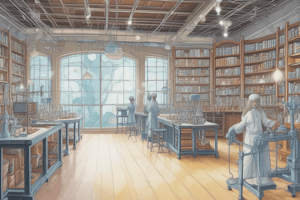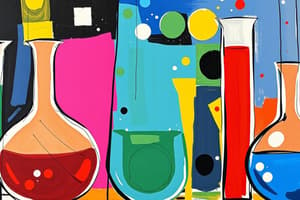Podcast
Questions and Answers
Which statement accurately describes the nature of gases?
Which statement accurately describes the nature of gases?
- Gases have a definite volume and fill their shape.
- Gases have neither a definite shape nor volume. (correct)
- Gases have a fixed shape but variable volume.
- Gases occupy only a small fraction of their container.
What represents the new substances formed during a chemical reaction?
What represents the new substances formed during a chemical reaction?
- Reactants
- Products (correct)
- Catalysts
- Inhibitors
What does stoichiometry primarily involve in chemical reactions?
What does stoichiometry primarily involve in chemical reactions?
- Identifying reactants only.
- Determining the quantitative relationships between reactants and products. (correct)
- Calculating the energy changes.
- Understanding periodic trends.
In the context of the periodic table, what do the rows represent?
In the context of the periodic table, what do the rows represent?
What accurately defines a solute in a solution?
What accurately defines a solute in a solution?
Which branch of chemistry specifically studies compounds containing carbon?
Which branch of chemistry specifically studies compounds containing carbon?
What is the primary difference between compounds and mixtures?
What is the primary difference between compounds and mixtures?
In an atomic nucleus, which particles determine the atomic number of an element?
In an atomic nucleus, which particles determine the atomic number of an element?
Which type of bond is formed through the transfer of electrons?
Which type of bond is formed through the transfer of electrons?
What defines isotopes of the same element?
What defines isotopes of the same element?
Which of the following states of matter has a definite volume but takes the shape of its container?
Which of the following states of matter has a definite volume but takes the shape of its container?
What is a characteristic of physical chemistry?
What is a characteristic of physical chemistry?
Which of the following statements about matter is FALSE?
Which of the following statements about matter is FALSE?
Flashcards
What are reactants?
What are reactants?
Substances involved in a chemical reaction that are changed.
What is stoichiometry?
What is stoichiometry?
The quantitative relationship between reactants and products in chemical reactions.
What is a solution?
What is a solution?
A homogeneous mixture where one substance (solute) dissolves in another (solvent).
What are acids?
What are acids?
Signup and view all the flashcards
What are bases?
What are bases?
Signup and view all the flashcards
What is Chemistry?
What is Chemistry?
Signup and view all the flashcards
What is an element?
What is an element?
Signup and view all the flashcards
What is a compound?
What is a compound?
Signup and view all the flashcards
What is a mixture?
What is a mixture?
Signup and view all the flashcards
What is an atom?
What is an atom?
Signup and view all the flashcards
What are isotopes?
What are isotopes?
Signup and view all the flashcards
What is chemical bonding?
What is chemical bonding?
Signup and view all the flashcards
What is a solid?
What is a solid?
Signup and view all the flashcards
Study Notes
Introduction to Chemistry
- Chemistry is the scientific study of matter, its properties, composition, structure, and the changes it undergoes.
- It's a central science, bridging physics, biology, and other disciplines.
- Chemistry encompasses a vast range of topics, including atomic structure, chemical bonding, reactions, and the properties of different materials.
- It studies the interactions between atoms and molecules, leading to the formation of compounds and complex systems.
Branches of Chemistry
- Inorganic chemistry: Studies the properties and reactions of inorganic compounds (not containing carbon).
- Organic chemistry: Focuses on compounds containing carbon, particularly those found in living organisms.
- Physical chemistry: Investigates the physical properties of matter and how they relate to chemical processes.
- Analytical chemistry: Develops methods for identifying and quantifying substances.
- Biochemistry: Explores the chemical processes occurring within living organisms.
Fundamental Concepts
- Matter is anything that occupies space and has mass.
- Elements are pure substances made of only one type of atom.
- Compounds are pure substances formed from two or more different elements chemically bonded together.
- Mixtures are combinations of two or more substances not chemically bonded.
- Atoms are the basic building blocks of matter.
- Molecules are groups of two or more atoms bonded together.
- Chemical reactions involve the rearrangement of atoms to form new substances.
Atomic Structure
- Atoms are composed of protons, neutrons, and electrons.
- Protons and neutrons are located in the nucleus, with protons having a positive charge and neutrons being neutral.
- Electrons orbit the nucleus and have a negative charge.
- The number of protons in an atom defines its atomic number.
- Isotopes are atoms of the same element with different numbers of neutrons.
Chemical Bonding
- Chemical bonds hold atoms together in molecules and compounds.
- Ionic bonds involve the transfer of electrons between atoms.
- Covalent bonds involve the sharing of electrons between atoms.
- Metallic bonds involve the sharing of valence electrons among a lattice of metal atoms.
- Bond strength and type influence molecular properties (like melting or boiling points).
States of Matter
- Matter exists in three primary states: solid, liquid, and gas.
- Solids have a definite shape and volume.
- Liquids have a definite volume but take the shape of their container.
- Gases have neither a definite shape nor volume, filling their container.
Chemical Reactions
- Chemical reactions involve the breaking and forming of chemical bonds.
- Reactants are the substances undergoing the change.
- Products are the new substances formed.
- Chemical equations represent chemical reactions using symbolic notation.
- Reactions can involve energy changes (endothermic or exothermic).
Stoichiometry
- Stoichiometry is the quantitative relationship between reactants and products in chemical reactions.
- It involves calculations to determine the amount of each substance needed or produced.
Periodic Table
- The periodic table organizes elements based on their atomic structure and properties.
- Elements with similar properties are grouped together in columns (groups or families).
- Rows (periods) indicate the increasing number of electron shells.
Solutions
- Solutions are homogeneous mixtures of two or more substances.
- The solute is the substance being dissolved, and the solvent is the substance doing the dissolving.
- Concentration describes the amount of solute in a given amount of solvent.
Acids and Bases
- Acids are substances that donate protons (H+ ions).
- Bases are substances that accept protons.
- The pH scale measures the acidity or basicity of a solution.
Studying That Suits You
Use AI to generate personalized quizzes and flashcards to suit your learning preferences.




